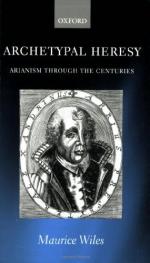|
This section contains 1,291 words (approx. 5 pages at 300 words per page) |

|
Arius was a controversial fourth-century Christian thinker in Alexandria, Egypt, who was condemned by the first ecumenical council at Nicaea in 325. Because most of his writings were destroyed as heretical and "Arianism" as a movement developed only after his death, historians continue to debate both the content and the purpose of his teaching. Theological debate continued for a century within Christianity, prompting a number of councils and creeds as well as a voluminous literature exploring the definition of God as Trinity, the origin of the divine Son, and the nature of salvation. From these events "Arianism" has been traditionally defined in theological polemic as a denial of the essential divinity of the Son and therefore of both the orthodox doctrines of Incarnation and Trinity.
Arius and the Council of Nicaea
As a Christian presbyter in Alexandria, Arius claimed a connection to a famous martyr...
|
This section contains 1,291 words (approx. 5 pages at 300 words per page) |

|


